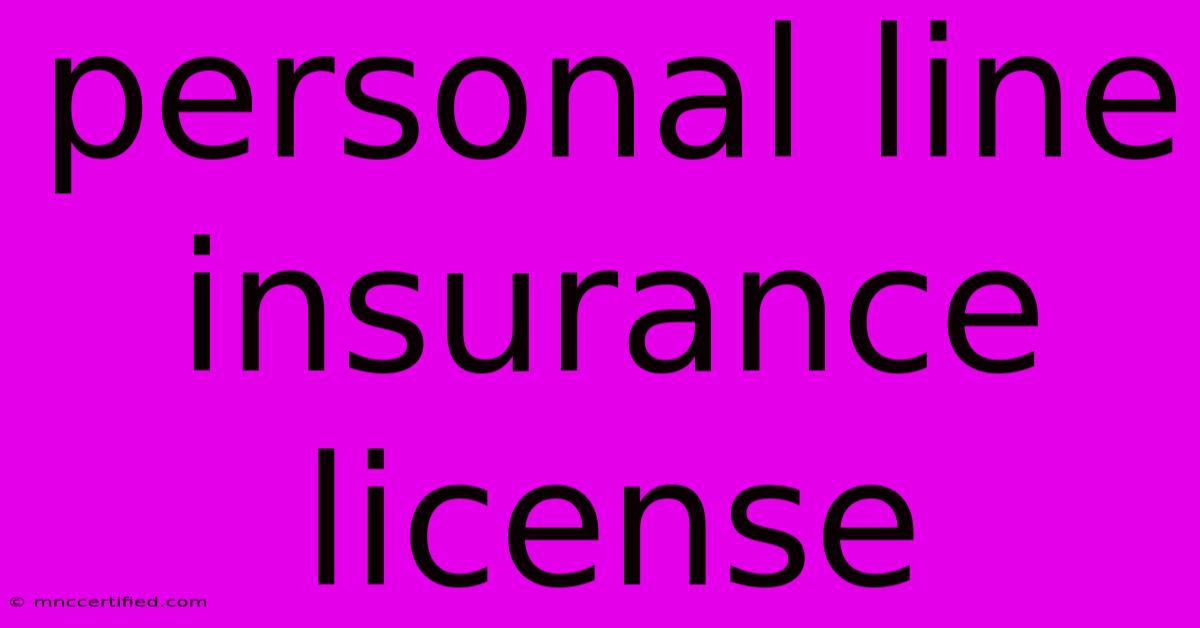Personal Line Insurance License

Table of Contents
Securing Your Future: The Comprehensive Guide to Obtaining a Personal Lines Insurance License
Are you considering a career in insurance? The personal lines insurance market offers diverse opportunities and significant earning potential. But before you can start advising clients on their homeowners, auto, or renters insurance needs, you'll need a personal lines insurance license. This comprehensive guide will walk you through the process, outlining the requirements, benefits, and steps involved in obtaining your license.
What is a Personal Lines Insurance License?
A personal lines insurance license authorizes you to sell and service insurance policies covering personal risks, including:
- Homeowners Insurance: Protecting against property damage and liability.
- Auto Insurance: Covering vehicle damage and liability for accidents.
- Renters Insurance: Protecting personal belongings and liability in rental properties.
- Umbrella Insurance: Providing additional liability coverage beyond primary policies.
- Recreational Vehicle Insurance: Covering boats, motorcycles, RVs, etc.
This license distinguishes you as a qualified professional capable of providing expert advice and assistance to individuals managing their personal insurance needs.
Requirements for Obtaining a Personal Lines Insurance License: A State-by-State Overview
The specific requirements for obtaining a personal lines insurance license vary significantly by state. There's no single national standard. Key aspects usually include:
- Age: Most states require applicants to be at least 18 years old.
- Education: While not always mandatory, completing a pre-licensing course is generally required. These courses cover insurance principles, regulations, and state-specific laws. Check your state's Department of Insurance website for approved courses.
- Examination: All states require passing a state-specific licensing exam. The exam tests your knowledge of insurance principles, state regulations, and ethics. Thorough preparation is crucial for success. Consider using practice exams and study guides.
- Background Check: You will undergo a background check to ensure you meet the required ethical and legal standards.
- Application and Fees: You'll need to complete a formal application and pay associated fees to your state's Department of Insurance.
Finding Your State's Specific Requirements
This is the most crucial step. Navigating the licensing process begins with your state's Department of Insurance website. Search "[Your State] Department of Insurance License Requirements" to find the relevant information. Look for specific details on:
- Pre-licensing education courses: Approved providers and course content.
- Exam details: Exam provider, scheduling, and cost.
- Application forms and procedures: Instructions, deadlines, and required documentation.
- Fees: Licensing, application, and other associated costs.
Benefits of Holding a Personal Lines Insurance License
The advantages of obtaining a personal lines insurance license are substantial:
- Career Opportunities: Opens doors to a wide range of roles in insurance agencies, brokerage firms, and even independent consulting.
- Earning Potential: The potential for high earnings is significant, especially with experience and a strong client base.
- Job Security: The insurance industry is relatively stable, offering a degree of job security compared to some other sectors.
- Intellectual Stimulation: Continuously learning about evolving insurance products and regulations provides ongoing intellectual stimulation.
- Helping Others: You'll be making a positive impact on people's lives by helping them protect their assets and families.
The Application Process: A Step-by-Step Guide
While specific steps vary by state, the general process typically involves:
- Research State Requirements: Thoroughly investigate your state's licensing requirements as described above.
- Complete Pre-Licensing Course: Enroll in and successfully complete an approved pre-licensing course.
- Schedule and Pass the Exam: Schedule your state's licensing exam and dedicate time to thorough preparation.
- Submit Application and Fees: Complete the application form accurately and submit it with all required documentation and fees.
- Background Check: Undergo the necessary background check.
- Receive Your License: Once approved, you will receive your personal lines insurance license.
Maintaining Your License: Continuing Education Requirements
After receiving your license, remember that most states require continuing education (CE) credits to maintain your license. This ensures you stay up-to-date on industry changes and best practices. Check your state's requirements for the specific CE credits needed annually.
Conclusion: Embark on Your Insurance Career
Obtaining a personal lines insurance license is an investment in your future. By following these steps and diligently researching your state's specific requirements, you can successfully navigate the licensing process and begin a rewarding career in the insurance industry. Remember that careful preparation, thorough understanding of your state's regulations, and commitment to ongoing professional development are key to long-term success.

Thank you for visiting our website wich cover about Personal Line Insurance License. We hope the information provided has been useful to you. Feel free to contact us if you have any questions or need further assistance. See you next time and dont miss to bookmark.
Featured Posts
-
Princes Guitar Fetches 381 000
Nov 23, 2024
-
Drift Protocol Price Prediction
Nov 23, 2024
-
Erivo Grande Wicked Tears On Set
Nov 23, 2024
-
F1 Wolff Reveals Vegas Track Benefits
Nov 23, 2024
-
Vendors Single Interest Insurance
Nov 23, 2024